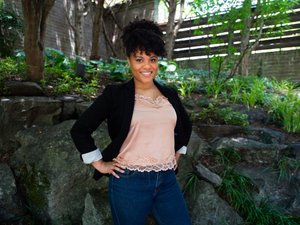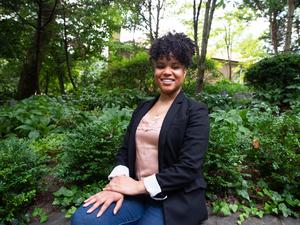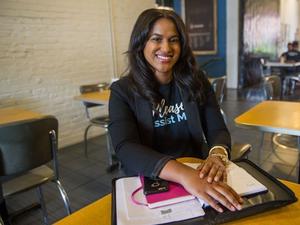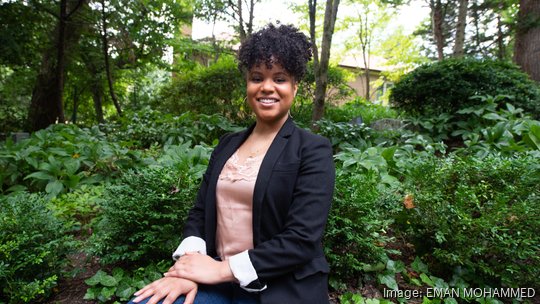
Not all seed fundings are created equal. Some are fought for from a hospital bed.
Dawn Myers, former director of national nonprofit Vinetta Project’s D.C. chapter, raised a $1.07 million pre-seed round from the likes of Dow Chemical Co.; West Coast venture firms Black Star Fund, Techstars and Revitalize Ventures Studios; New York-based LimeLife by Alcone's Empire fund; and D.C.'s own 1863 Ventures for her hair care accessory business, Richualist — not unusual on its face. But she did it while battling stage 3 colon cancer.
She had started fundraising for that round in January 2021, expecting to close one year later. She received a cancer diagnosis instead.
And while many advisers and investors had told her to put her company, formerly known as The Most, on hold and focus on her health, she decided to fight to grow her company while fighting for her life. She spent the last year taking investor calls from hospital beds and working to nail down the manufacturing pipeline for her hair care and relaxing tools in Maryland and abroad while undergoing chemotherapy sessions and an experimental procedure — all in preparation for launching direct online product sales this past March.
“You have to have a purpose. You have to have a reason to fight,” said Myers, who said she's in fundraising mode once again. “This company, realizing this mission, was my reason to fight. It was really what gave me a reason to wake up. It gave me a reason to do all the things, take all the pills, go to all the doctor's appointments.”
That came as Myers had also left Vinetta Project, a national effort to close the funding gap for female founders, at the start of last year — and had even left D.C. altogether to move to Baltimore to be closer to other female Black entrepreneurs.
From product to fundraising mode
Myers had started her company to help fix an entirely different self care issue — to find a way to make hair styling easier and less time-intensive, for herself and other women of color with more complex or tighter curls.
Founded in 2018, Richualist sells hair tools, appliances and serums, with its premier product called Mint, a hair tool that is a cross between a flatiron and a hot comb, utilizing heat to care for and style hair in half the time Myers said it might normally take to detangle and arrange curly hair on shampoo day.
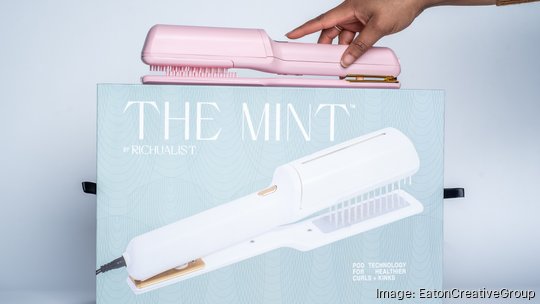
She had founded her firm already when she took on the role of D.C. chapter lead for the Vinetta Project, started in Los Angeles by California entrepreneur Vanessa Dawson. The nonprofit aimed to address and reverse a startling stat: Barely 2% of venture capital funding went to startups founded solely by women. While the D.C. chapter was active under Myers, it hosted pitch competitions for female-founded startups with $20,000 in no-strings-attached funding and networking events for the startup community. By mid-2020, it had built a local network of more than 100 investors and 267 founders, including 23 companies that raised a collective $35.7 million in funding.
But Myers said she ran into criticism of Vinetta's approach from founders of color who said they didn't feel equally supported by the organization.
“There were a lot of people who saw this organization as a little antagonistic toward Black women,” said Myers, who believes she was brought on in part to fix that perception. “Once I got into [Vinetta], some of that was confirmed. Now I want to be clear, there are a lot of VCs, a lot of people within that ecosystem that really supported underrepresented founders of all mixes and colors. But then there were people who were absolutely more antagonistic.”
It's unclear if Vinetta Project is still operating today. Myers said she doesn't know of any active programming in D.C. or beyond. We have reached out to the organization and its founders and will update this when we hear back.
But the question for Myers is what fills that void as women continue to be sidelined in fundraising. She noted organizations like Black Girl Ventures and The Women’s Association of Venture and Equity as helping fill the gap. "Intersectionality is key here," she said, citing a lack of such intersectionality for her reason for departing Vinetta Project and focusing wholly on Richualist.
"No one organization is going to be able to support women comprehensively," Myers said. "But every organization has an obligation to do this work equitably."
When she left both Vinetta Project and D.C. as a result, she decided to focus more wholly on Richualist, a take on the word "rich" to connote a luxury spa-like product. She worked to raise pre-seed funds to launch Mint sales from the company's website, directly to consumers, while separately narrowing down a list of major retailers to approach and social media influencers to help her market it.
Balancing health and entrepreneurialism
Then, suddenly last year, she needed to adapt her growth plan around her chemo schedule.
She had two options: Undergo chemotherapy in short intervals, back to back. Or take higher doses on the front end for a longer interval, but have a week or two afterwardwhere she could be more functional. Myers chose the long interval.
“My team knew the first week of each chemo round, I’m going to be really suffering. I can’t talk to anyone outside of our internal organization,” she said. “I'm going to be really weird, crazy and I'm not going to look like myself. But we knew if we schedule all of those meetings in the second and third week of each round, I should be able to make it work.”
It ended up being serendipitous that Myers had decided to depart Vinetta Project and move from D.C. to Baltimore when she did, not long before she received her cancer diagnosis. Her new proximity to Johns Hopkins University Hospital allowed her to have an experimental uterine transposition procedure to preserve her ability to have children. The procedure removed her reproductive organs and implanted them in her rib cage while she underwent chemotherapy. When she was finally cancer-free a year later, her medical team returned her reproductive organs to their original place.
“I just happened to be living 10 minutes away from Johns Hopkins and the most sophisticated colorectal cancer practice in the world,” she said.
Now, Myers plans to remain in Baltimore to grow Richualist, where "rich" is meant to connote luxury care — she declined to disclose revenue for the four-person company but said she's encouraged by its sales thus far. As for Baltimore, she said it reminds her of D.C. 20 years ago, with the older flavor and character of Chocolate City much more apparent in today's Charm City, she said.
“There’s still Black-owned businesses on main streets here," she said. "There's no part of Baltimore where you will walk through and not see a Black person.”
